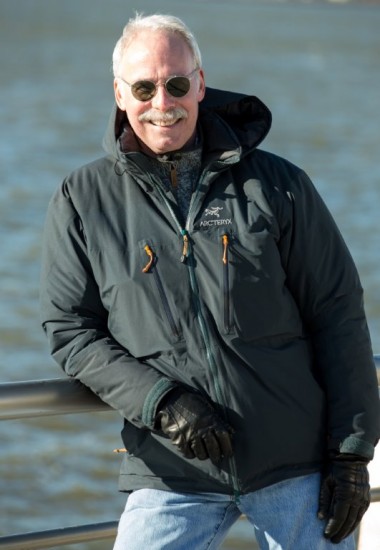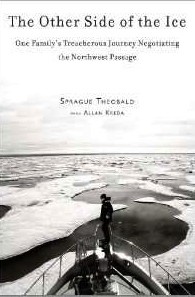
Sprague Theobald details his family’s treacherous journey to the Northwest Passage in new book and film (photo by Rod Millington)
THE OTHER SIDE OF THE ICE (Sprague Theobald, 2013)
Quad Cinema
34 West 13th St. between Fifth & Sixth Aves.
March 8-14
212-255-2243
www.quadcinema.com
www.spraguetheobald.com
On June 16, 2009, author, sailor, and filmmaker Sprague Theobald boarded the 325-horsepower, 57-foot-long Bagan and took off for the Northwest Passage with a small crew that included his son, Sefton, his stepson, Chauncey Tanton, his stepdaughter, Dominique Tanton, and her boyfriend, Clinton Bolton, setting sail on a journey that few have attempted and fewer have survived. “The Northwest Passage is a ship killer, and always has been,” Theobald writes in The Other Side of the Ice: One Family’s Treacherous Journey Negotiating the Northwest Passage (Skyhorse Publishing, August 2012, $24.95; ebook available from Antenna Books, $9.99), which details the trials and tribulations he and his family experienced on the open seas. “At various stages of the journey, I found myself numb. Exhausted. Terrified. How had it all started? What were we doing?” A transatlantic racer, Theobald, who has previously written the novel The Reach and won an Emmy for his America’s Cup documentary The 25th Defense: End of an Era, explains exactly what they were doing, warts and all, in the book and its companion film, also called The Other Side of the Ice, a production of his Hole in the Wall team, which is a self-described “consortium of renegades, misfits, and malcontents intent on bettering the world through the art of film and storytelling.” The Other Side of the Ice will be playing at the Quad from March 8 to 14, and Theobald will be at the theater to discuss the film and sign copies of the book following the 7:30 screenings on March 8 and 9 and after the 5:30 show on March 10. But first Theobald discussed the book, the film, and the state of his family in our latest twi-ny talk.
twi-ny: You begin both the book and the film by wondering whether you were in essence risking the lives of your family in order to accomplish this personal mission of sailing through the Northwest Passage. If you knew then what you know now, would you still go ahead with the trip?
Sprague Theobald: Knowing what I know now, I would certainly still go ahead with the trip but with a better sense of how deep and deliberating the extreme Arctic isolation can be, the hell it can raise on your thinking if not your soul. This I wasn’t prepared for.
twi-ny: What would you change if you had it to do all over again?
Sprague Theobald: If I had it to do all over again I would have spent a bit more time vetting the captain, who I was assured “could handle anything.” As it was he fell mentally and fell hard. I hired him so that I could concentrate on the documentary, but in the end I had to toss him off the boat and bring the boat, with the great help of my three children, to Seattle through three thousand miles of some of the world’s most torturous weather.
twi-ny: When the Bagan was stuck in the ice with nowhere to go, did you always think you’d eventually make it, or were there moments when you truly felt that you would join other Northwest Passage crews who were never seen or heard from again?
Sprague Theobald: While stuck in the ice and at one point alone in my cabin I thought, Jesus . . . I’ve missed the headline on this trip. All the while I thought it was going to be “Family Successfully Transits the Northwest Passage,” but instead the real headline is now, “Father Leads Children to Death Trying to Transit the Northwest Passage.” This was as real as real could be. I had to battle this thought and image, plus many more, minute after minute, hour after hour, day after day. I thought, Yes, the odds looked incredibly against us, but the only way to find out was to, if physically possible, continue to put one foot in front of the other and see where this takes us. I did my very best to keep these thoughts to myself and not share them with the kids. It was a pressure that, as I explain in the book and show in the documentary, I’d never before known and didn’t know if I could survive.
twi-ny: There were 280 hours of footage that were edited into a 77-minute film, and there was a four-month trip edited into a 220-page book. Which task did you ultimately find most challenging, making the film or writing the book? Did you make a conscious decision to save certain moments for the film and specific other ones for the book?

Sprague Theobald: No, I didn’t make a conscious decision to save “this” for the book or “that” for the film. What I did have to do, though, was go back through my personal journal, which, once the trip was over, I prayed I’d never have to look at again. After Herzog made Fitzcarraldo, he was too terrified to look at his personal journal for twenty-eight years. By no means do I compare myself to him, but I do understand the power and terror these raw words, written when all seemed lost, can carry.
twi-ny: In the book you write, “On very rare occasions, if you’re very lucky, you get a chance to look into someone’s heart and character.” What did you learn about your own heart and character on the journey?
Sprague Theobald: I found out that I am simply human, no more, no less. That if one gets too close to hubris, in any sense of the word, the stakes become extreme, the flame more powerful and hotter than anything imaginable in this world.
twi-ny: What did you find out about your family’s heart and character that most surprised you?
Sprague Theobald: I found out that my family’s heart is as strong as I had ever dreamt for it, wished for it to be, if not stronger. Their sense of commitment and total lack of selflessness, when one of them around them was demonstrating just the opposite, was a gift greater than I ever expected to be given.
twi-ny: Have the bonds that developed with your kids on the boat continued?
Sprague Theobald: Big time. It’s not to say that we’re in touch more often or that we call and have long talks over the phone any more than we did but that when we do get together the laughter and joy come from a base and foundation of the deepest respect and love. We now know what’s petty and what isn’t.
twi-ny: Now that the book has been published and the film is being released, are you getting the itch to travel again?
Sprague Theobald: This has kept me busy every single hour of every single day since we landed in Seattle on November 6, 2009. I truly haven’t had a day off in over five years. From time to time, though, I do daydream about talking a kayak from the headwaters of the Connecticut River up in Canada to where it terminates in the Atlantic, the Long Island Sound. But it’s going to be a while before I play out of the backyard again.